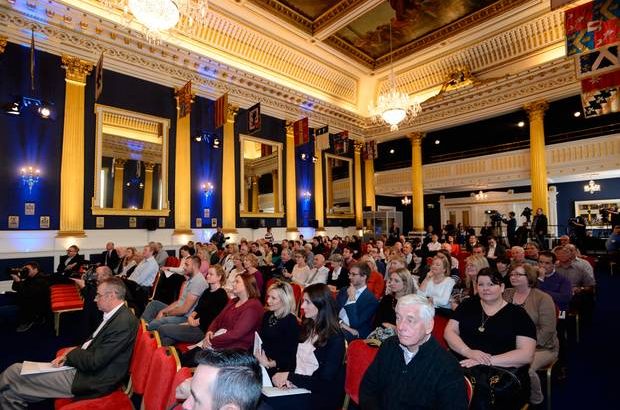I spent way too much time last Saturday glued to my screens watching the proceedings of the Citizens’ Assembly, streaming on the RTÉ News Now channel and online. It was a lot to take in.
First off, I found it rather disconcerting to find an unrepresentative bunch of citizens (100 to represent four million?) meeting in a comfortable civilised setting, effectively sitting in judgement on the right to life of a vulnerable group of human beings. If it was even suggested for another vulnerable group can you imagine the outrage?
I was impressed by the contribution of Dr Peter McParland of The National Maternity Hospital in Holles Street. He said stuff to please and displease both sides, but he did draw attention to what actually happens to the baby in an abortion, and to the way Down Syndrome babies are routinely screened and aborted in Iceland and Denmark.
He gave disturbing figures on why Irish women get abortions in England – in 2015 40 babies were aborted for Down Syndrome, and some also for Spina Bifida and even Cystic Fibrosis – conditions that weren’t really in the ‘life-limiting’ category at all.
He flagged the increasing ethical issues caused by easier pre-natal screening, but also made it clear also that pre-natal diagnoses can sometimes be wrong, and that doctors can’t be certain how long a baby with ‘life limiting’ conditions will live outside the womb.
In the afternoon, on the pro-life side, Dr Helen Watt played a blinder, giving a pro-life masterclass that was well informed, compassionate and clear thinking. She was well able to field difficult questions in the Q&A session at the end of the day – check out her contributions on YouTube.
Basically I think her point was that your rights as a human being didn’t depend on or vary with your state of health, the length of time you were likely to live, or whether you were inside the womb or out.
Approach
On Sunday’s Six-One News on RTÉ 1, Joe Little reported on that Iceland reference, describing that country’s approach as “doing away with” the birth of Downs children. Just then his lights went out and the outside broadcast ended!
By that Sunday night, RTÉ was reporting the news that there were: ‘Indications Citizens’ Assembly favours less restrictive laws on abortion’ – predictable, but surprising for it to come out at this stage… a downbeat note to end the weekend’s deliberations.
The Big Questions returned to BBC One last Sunday morning and got off to a lively start with a discussion on the morality of huge salaries, especially in relation to the CEOs of large private companies.
It was good to see an issue like that being regarded in moral terms. Likewise the second topic – as to whether industrial action should target only employers and not customers or users of a service.
This was in the context of ongoing and upcoming rail strikes in England, and one contributor suggested the ploy of having the workers refusing to collect fares and letting the customers use the service for free, thus hitting the employers where it hurts but letting the travellers go about their business without disruption. More moral?
In the context of the Epiphany, the third question was whether the ‘wise men’ today would believe in God. As usual, there was a variety of views and I found it reasonably well balanced. I was impressed by the gentle contribution of Russell Cowburn, a Cambridge professor in experimental physics, a Christian who believed in angels and who lived what he called the ‘wonderful tension’ between science and faith.
Also defending a rational and well balanced approach to religious faith was author Dr Vince Vitale who was confident and cheerful in his contributions.
Finally, I’ve now seen the first two episodes of RTÉ 1’s new Sunday night drama Striking Out. Amy Huberman is the best thing about it, sympathetic in the lead role of a solicitor whose fiancé is unfaithful to her shortly before the wedding.
The emotional impact of the betrayal was substantially lessened as we hadn’t come to know these characters very well before the discovery.
Apart from Huberman’s Tara, most other characters are self-obsessed, pampered and off-putting. Predictably there was a sex scene at the start (to up the rating?) but apart from a few unnecessary profanities the language so far is thankfully restrained.
Pick of the week
FILM: On the Waterfront
BBC 2 Saturday, January 14, 10.40 pm
(1954) Multi-Oscar-winning story of conflict among dockers and gangsters. Karl Malden plays a priest passionate about social justice. Director: Elia Kazan.
WHERE GOD WEEPS
EWTN Saturday, January 14, 7 pm
With Peter Sefton-Williams, Chief-Editor of The Religious Freedom Report published by Aid to the Church in Need.
Ballykissangel
be3 Sunday, January 15, 6 pm
Starting a re-run of the popular series. Fr Clifford arrives from England, to the remote Irish village of Ballykissangel.


 Brendan O’Regan
Brendan O’Regan Citizens assembly
Citizens assembly